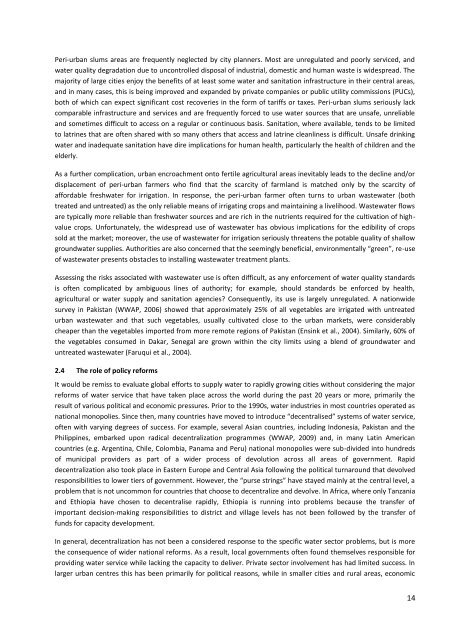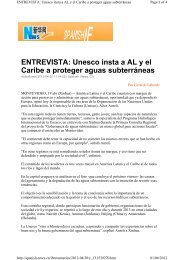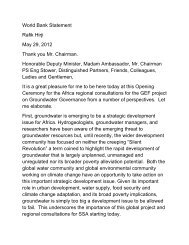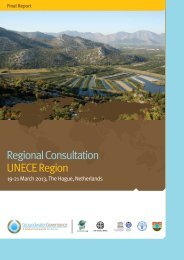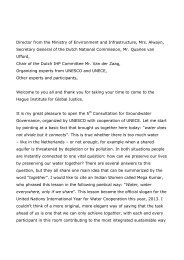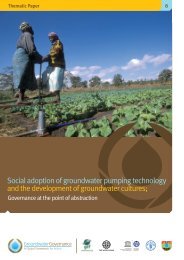Peri-urban slums areas are frequently neglected by city planners. Most are unregulated and poorly serviced, andwater quality degradation due to uncontrolled disposal of industrial, domestic and human waste is widespread. Themajority of large cities enjoy the benefits of at least some water and sanitation infrastructure in their central areas,and in many cases, this is being improved and expanded by private companies or public utility commissions (PUCs),both of which can expect significant cost recoveries in the form of tariffs or taxes. Peri-urban slums seriously lackcomparable infrastructure and services and are frequently forced to use water sources that are unsafe, unreliableand sometimes difficult to access on a regular or continuous basis. Sanitation, where available, tends to be limitedto latrines that are often shared with so many others that access and latrine cleanliness is difficult. Unsafe drinkingwater and inadequate sanitation have dire implications for human health, particularly the health of children and theelderly.As a further complication, urban encroachment onto fertile agricultural areas inevitably leads to the decline and/ordisplacement of peri-urban farmers who find that the scarcity of farmland is matched only by the scarcity ofaffordable freshwater for irrigation. In response, the peri-urban farmer often turns to urban wastewater (bothtreated and untreated) as the only reliable means of irrigating crops and maintaining a livelihood. Wastewater flowsare typically more reliable than freshwater sources and are rich in the nutrients required for the cultivation of highvaluecrops. Unfortunately, the widespread use of wastewater has obvious implications for the edibility of cropssold at the market; moreover, the use of wastewater for irrigation seriously threatens the potable quality of shallowgroundwater supplies. Authorities are also concerned that the seemingly beneficial, environmentally “green”, re-useof wastewater presents obstacles to installing wastewater treatment plants.Assessing the risks associated with wastewater use is often difficult, as any enforcement of water quality standardsis often complicated by ambiguous lines of authority; for example, should standards be enforced by health,agricultural or water supply and sanitation agencies? Consequently, its use is largely unregulated. A nationwidesurvey in Pakistan (WWAP, 2006) showed that approximately 25% of all vegetables are irrigated with untreatedurban wastewater and that such vegetables, usually cultivated close to the urban markets, were considerablycheaper than the vegetables imported from more remote regions of Pakistan (Ensink et al., 2004). Similarly, 60% ofthe vegetables consumed in Dakar, Senegal are grown within the city limits using a blend of groundwater anduntreated wastewater (Faruqui et al., 2004).2.4 The role of policy reformsIt would be remiss to evaluate global efforts to supply water to rapidly growing cities without considering the majorreforms of water service that have taken place across the world during the past 20 years or more, primarily theresult of various political and economic pressures. Prior to the 1990s, water industries in most countries operated asnational monopolies. Since then, many countries have moved to introduce “decentralised” systems of water service,often with varying degrees of success. For example, several Asian countries, including Indonesia, Pakistan and thePhilippines, embarked upon radical decentralization programmes (WWAP, 2009) and, in many Latin Americancountries (e.g. Argentina, Chile, Colombia, Panama and Peru) national monopolies were sub-divided into hundredsof municipal providers as part of a wider process of devolution across all areas of government. Rapiddecentralization also took place in Eastern Europe and Central Asia following the political turnaround that devolvedresponsibilities to lower tiers of government. However, the “purse strings” have stayed mainly at the central level, aproblem that is not uncommon for countries that choose to decentralize and devolve. In Africa, where only Tanzaniaand Ethiopia have chosen to decentralise rapidly, Ethiopia is running into problems because the transfer ofimportant decision-making responsibilities to district and village levels has not been followed by the transfer offunds for capacity development.In general, decentralization has not been a considered response to the specific water sector problems, but is morethe consequence of wider national reforms. As a result, local governments often found themselves responsible forproviding water service while lacking the capacity to deliver. Private sector involvement has had limited success. Inlarger urban centres this has been primarily for political reasons, while in smaller cities and <strong>rural</strong> areas, economic14
viability is an additional problem. Thus, the real transition for most water consumers has not been from public toprivate, but rather from unregulated centralized public provision to regulated decentralized public provision. Today,most urban and peri-urban areas in the world are served by publicly owned and managed utilities, a model that islikely to continue (WWAP, 2009). In many developing countries, the performance of public utilities is oftenconstrained by low motivation, poor management, inadequate cost recovery and political interference. The lack ofpublic sector reform can be a serious obstacle to sustaining and increasing coverage and service. A particularchallenge is to encourage public sector utilities to extend services to informal urban settlements (mostly slum areas)where cost recoveries tend to be low. Remarkably, good success can be achieved in such situations by partneringwith local community groups or supporting private sector initiatives. For example, new contractual approaches havebeen developed in Paraguay, for example, to target the increased involvement of aguateros (mostly small-scalewater companies), that have developed piped water supplies in peri-urban areas without public funding. Theseaguateros can now legally take part in public bidding processes, and their performance can be monitored, thusimproving accountability.2.5 IWM, IWRM, IUWM and the role of groundwaterIntegrated Water Resources Management (IWRM) together with its similarly motivated sister water managementprinciples (IWM - Integrated Water Management and IUWM – Integrated <strong>Urban</strong> Water Management) was firstpromoted by the United Nations in the 1950s. IWRM principles featured strongly at the United Nations WaterConference, held in Mar del Plata, Argentina, in March 1977 but the concept did not enjoy any serious traction untilthe 1990s when the principles of IWRM began to be endorsed by numerous international institutions.IWRM is defined as “a process which promotes the coordinated development and management of water, land andrelated resources, in order to maximize the resultant economic and social welfare in an equitable manner withoutcompromising the sustainability of vital ecosystems” (GWP, 2000). Operationally, IWRM (and similar approaches)involves the application of knowledge from a range of disciplines, together with the insights from stakeholders, todevelop and deliver efficient, equitable and sustainable solutions to the world’s water problems. It can be describedas a comprehensive tool for managing, developing and delivering water to consumers in a way that is socially,economically and environmentally responsible.The IWRM model has enjoyed considerable acclaim. It has been adopted as a pre-requisite for compliance withinthe European Union’s Water Framework Directive of 2000, and has provided guidance for subsequent EU waterdevelopment programs such as the EU Water Initiative. Moreover, IWRM’s open, multi-stakeholder approach towater management is undoubtedly the primary reason that the role of governance in water issues has achievedglobal attention. That said, IWRM is not a panacea for the world’s water problems and has, from a purely practicalstandpoint, done little more than raise awareness for the complexity of urban water problems and point thoseresponsible for solving such issues in more productive directions. While IWRM’s primary attribute is its demand thatglobal water issues be approached holistically, the number of factors that need to be considered and “integrated” isso large that practical implementation is impossible unless the list is strongly redacted. Herein, serious problemsarise. According to Biswas (2008), the application of IWRM to real world water projects has left much to be desired.At a scale of 1 to 100 (1 being no integrated water resources management and 100 being full integration) Biswassuggests that there isn’t a project in the world that would earn a score of 30 or more from an objective analyst.In effect, the success of IWRM as a practical tool depends heavily on the factors selected for “integration” i.e. whichare listed and which are omitted. Since the term “water” includes both ground and surface water sources byimplication, it is generally assumed that groundwater and the role of aquifers are automatically included withinIWRM’s process of integration. In practice, nothing could be further from the truth. Debates on global water policythat rage at international water fora remain largely transfixed on surface water issues. For the most part, very littlerecognition or weight tends to be given to the vital function that groundwater plays in the global water cycle andthe immense benefits that could be derived from the improved management of groundwater. A failure to recognisethe unique and special attributes of groundwater represents one of the lost opportunities of IWRM.15
- Page 3 and 4: GROUNDWATER GOVERNANCE:A Global Fra
- Page 5 and 6: List of FiguresFigure 1 Global and
- Page 7 and 8: and Karachi (Pakistan) with rates w
- Page 9 and 10: increased risk to livelihoods from
- Page 11 and 12: Understanding and accounting for th
- Page 13 and 14: through a series of distinct stages
- Page 15: Despite the enormity of the urban g
- Page 19 and 20: especially where local aquifers are
- Page 21 and 22: Clearly, solutions are available to
- Page 23 and 24: 2) the State of Mexico, which suppl
- Page 25 and 26: easons: it would enable these costs
- Page 27 and 28: have developed and implemented stra
- Page 29 and 30: Domestic and low-demand commercial
- Page 31 and 32: 4 Groundwater Governance and Opport
- Page 33 and 34: Efficient management of the resourc
- Page 35 and 36: understanding of the resource setti
- Page 37 and 38: to the problem that seeks to make p
- Page 39 and 40: 2) A carefully conceived program, w
- Page 41 and 42: domestic sewage, while in rural are
- Page 43 and 44: production (largely controlled by n
- Page 45 and 46: FOSTER, S., CHILTON, J., MOENCH, M.
- Page 47: THEESFELD, I. 2010. Institutional c


